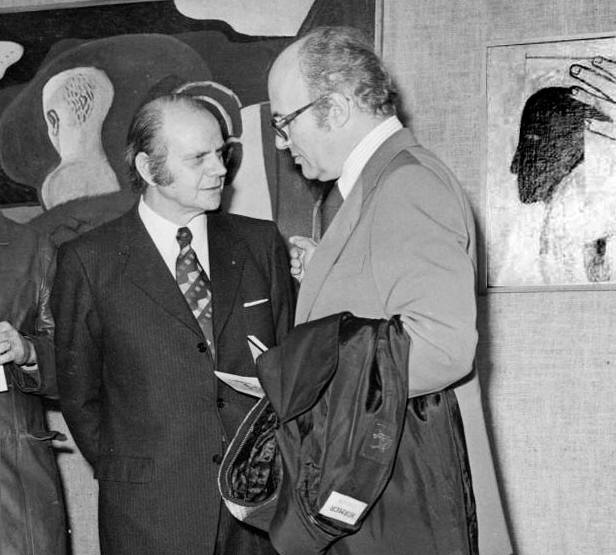|
Friedrich A. Schultz
Director of the
Goethe Institut in Palermo until 1977
In 1978 he founded the Goethe Institut in Chicago
Palermo 26 November1974 - Palazzo del Turismo
Dr. Friedrich A. Schultz makes the inaugural speech
for the Exhibition of works by Louis Christian Hess
“Ladies and gentlemen,
Christian Hess could have been here with us; today he would have been
only 79 years old. He was born in Bolzano, then his family moved to
Innsbruck where his father was to die when Christian was just 13 – the
first of his life’s misfortunes. He had to leave high school and start
an apprenticeship. Just two years later, another misfortune: the First
World War broke out and he became a soldier. At the end of the conflict
he moved to Munich to study at the Academy of Fine Arts, in those years
so poor in Germany. As a student he began copying works by old masters.
In the tradition of aspiring artists, he also began traveling in Europe.
He was a frequent visitor to Scandinavia and a number of other European
countries. He came to Italy and finally to Sicilia where his sister
lived. He married, but the marriage failed - more bad luck. And just a
few months, a few days, before the end of the Second World War he was
killed by a bomb in a city that had been relatively untouched by the
war, Innsbruck. But perhaps the greatest tragedy of his short life was
the change on the political scene in his homeland, Germany where, after
1933, no artist was allowed to pursue his own individual style, no one
was allowed any longer to express themselves freely through their art.
This was perhaps one of the reasons
which brought Christian Hess here to Sicily. His relationship with this
island may be followed here in this room, this evening. Only 60
paintings and 4 sculptures are on show. They are works from the period
between 1922-1938.
From that last date no other of his works were left here in Sicily.
What are these pictures about, what can
they tell us? They can tell us about the development of a very honest
artist who in the course of his life demonstrated that the most sincere
form of artistic expression is the expression of deep emotion and
sentiment through simple means. Living in Sicily as a foreigner is an
intense and significant experience. Sicilians - and Italians for that -
are a strange people. They love self-criticism. That’s why you may hear:
“We never manage to do anything beautiful, anything useful.”
 |
The journalist Domenico M. Ardizzone
(left) with Friedrich A. Schultz
|
But over these last few days Sicilians
have shown great interest in things that are of great beauty, that are
useful and are also foreign. They have inaugurated not only this
exhibition, but also the one on the work of Walter Gropius. This has
been achieved thanks to cooperation between private individuals and
municipal, provincial and state organisations. Writers and art critics
have made their contribution. You may discover their names by looking
through the catalogues, including the one for the Hess exhibition, which
has been published and printed by the Cassa di Risparmio. The councillor
for tourism has granted us the use of this fine room. We have with us
prof. Leonardo Sciascia who wrote the introduction for the
catalogue. For we Germans, all that remains for us to say is: thank you
to everyone. As the Goethe Institut, we are pleased to take this
exhibition from one Italian city to another.
In January it will open in Rome; then it will visit Padua, Trieste,
Genoa, Bolzano, Turin, Milan, etc. I should like to conclude by thanking
all those: from the Mayor, to dott. Bevilacqua, to prof. Sciascia and
all the others for their work and cooperation, and finally all those
who have spoken.”.
|
Dr. Friedrich A. Schultz was one of the first to offer his
support for the project to rediscover the works of Christian
Hess. He worked closely with the Regional Government of
Sicily to bring about the exhibition in Palermo and, with
the support of the various branches of the Goethe Institut,
the subsequent stages of the traveling exhibition in Italy
and Europe. The name of Friedrich A. Scultz has been
included in the Honour Roll of the Christian Hess Cultural
Association to honour his memory. |
|